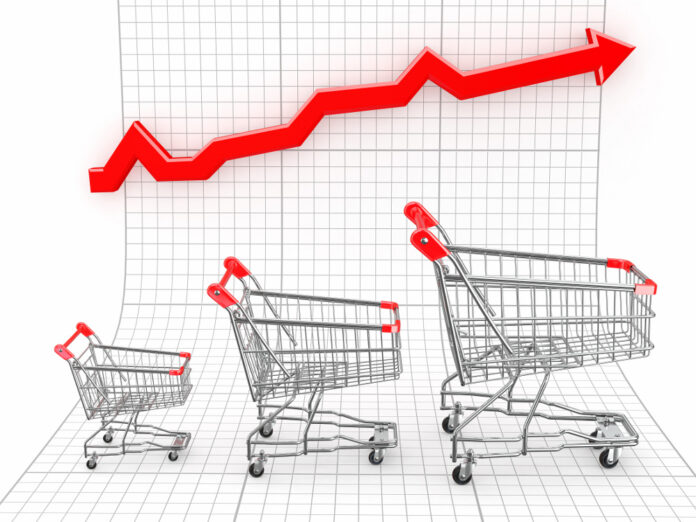The Virginia Index of Consumer Sentiment climbed almost 8 points over the last quarter, making up half of the COVID-19 losses from the second quarter. The index remains about 2.5 points below its five-year average. The August 2020 value is 89.1 and is driven by tremendous enthusiasm and confidence in the economy, regardless of political affiliation.
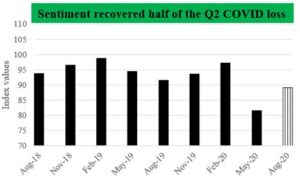 Figure 1 illustrates the second quarter hollowing out of the near-record sentiment values from the first quarter of 2020 and the subsequent rebound in the third quarter. Twenty-eight percent of respondents report that their household finances are improved from a year ago, a seven-point increase since May. Nationally, the July unemployment rate is 10.2 percent, a rapid fall off from the COVID recession high of 14.7% in April. In the Commonwealth, the unemployment rate is 8.0%, down over three points since April.
Figure 1 illustrates the second quarter hollowing out of the near-record sentiment values from the first quarter of 2020 and the subsequent rebound in the third quarter. Twenty-eight percent of respondents report that their household finances are improved from a year ago, a seven-point increase since May. Nationally, the July unemployment rate is 10.2 percent, a rapid fall off from the COVID recession high of 14.7% in April. In the Commonwealth, the unemployment rate is 8.0%, down over three points since April.
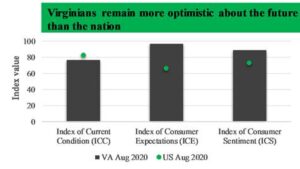
Virginians’ view of the COVID-effect on the economy differs from the nation as illustrated in Figure 2. Respondents from the Commonwealth are much more concerned about the current economy, particularly businesses. Eighty-five percent believe that business conditions are worse today than a year ago, down four points since May. Virginians are considerably more optimistic about the economy turning around in the coming years, with only 17% reporting worsening business conditions in the next year, down 12 points since May.
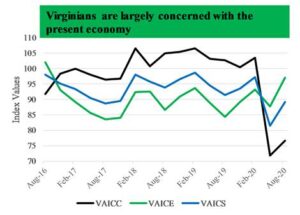
Forty-eight percent believe that the next three to five years will be a period of economic growth and prosperity compared to 38% who expect a period of high unemployment and stagnation. Figure 3 shows the three consumer sentiments over time, each rebounding from the second quarter.
After a dramatic second quarter increase in the long-term price expectations, it fell back to typical levels. The long-term value is currently 3.5%, just above the short-term price expectations. Respondents are sensitive to the prices that they see around them daily. Gas prices increased over the summer while some food prices remain elevated due to COVID-related shortages and supply chain issues. Nationally, consumer prices increased 0.6% in July.
Analysis
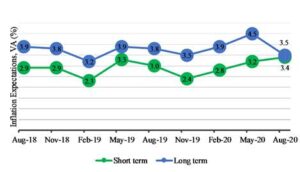
“Consumer sentiment in the Commonwealth rebounded nicely since the second quarter. That move is primarily driven by confidence in our economy over the next few years. The 2020 recession was unlike traditional economic recessions in that it was not caused by challenges with underlying economic fundamentals in areas like the finance or real estate markets. Instead, it was induced by a virus. Policy was largely focused on keeping people at home and afloat rather than encouraging them to spend, as is typical of fiscal policy during recent recessions. Although the economic downturn is devastating for many, the bright side is the strong fundamentals that suggest a faster than normal recovery. Consumer sentiment behavior in Virginia speaks in support of this.”
Methodology
Interviewing for The Virginia Consumer Sentiment and Inflation Expectations Report was conducted by The Institute for Policy and Opinion Research at Roanoke College in Salem, Virginia, between August 9 and August 22, 2020. A total of 659 Virginians were interviewed. du/consumersentiment.

